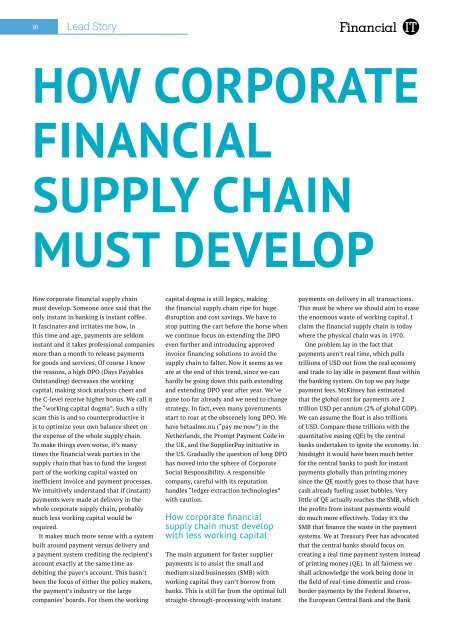Revolutionizing the Financial Markets
Cím: Forradalmasítja a pénzügyi piacok Leírást/ellenőrzések: Több mint 100 000 előfizetőt, amelyek 70 %-a bankok, a pénzügyi az összpontosított közzététele a vezető pénzügyi technológiai hírek a világ, beleértve a technológia blockchain és a cryptocurrencies.
Cím: Forradalmasítja a pénzügyi piacok
Leírást/ellenőrzések: Több mint 100 000 előfizetőt, amelyek 70 %-a bankok, a pénzügyi az összpontosított közzététele a vezető pénzügyi technológiai hírek a világ, beleértve a technológia blockchain és a cryptocurrencies.
- No tags were found...
You also want an ePaper? Increase the reach of your titles
YUMPU automatically turns print PDFs into web optimized ePapers that Google loves.
30<br />
Lead Story<br />
HOW CORPORATE<br />
FINANCIAL<br />
SUPPLY CHAIN<br />
MUST DEVELOP<br />
How corporate financial supply chain<br />
must develop. Someone once said that <strong>the</strong><br />
only instant in banking is instant coffee.<br />
It fascinates and irritates me how, in<br />
this time and age, payments are seldom<br />
instant and it takes professional companies<br />
more than a month to release payments<br />
for goods and services. Of course I know<br />
<strong>the</strong> reasons, a high DPO (Days Payables<br />
Outstanding) decreases <strong>the</strong> working<br />
capital, making stock analysts cheer and<br />
<strong>the</strong> C-level receive higher bonus. We call it<br />
<strong>the</strong> “working capital dogma”. Such a silly<br />
scam this is and so counterproductive it<br />
is to optimize your own balance sheet on<br />
<strong>the</strong> expense of <strong>the</strong> whole supply chain.<br />
To make things even worse, it’s many<br />
times <strong>the</strong> financial weak parties in <strong>the</strong><br />
supply chain that has to fund <strong>the</strong> largest<br />
part of <strong>the</strong> working capital wasted on<br />
inefficient invoice and payment processes.<br />
We intuitively understand that if (instant)<br />
payments were made at delivery in <strong>the</strong><br />
whole corporate supply chain, probably<br />
much less working capital would be<br />
required.<br />
It makes much more sense with a system<br />
built around payment versus delivery and<br />
a payment system crediting <strong>the</strong> recipient’s<br />
account exactly at <strong>the</strong> same time as<br />
debiting <strong>the</strong> payer’s account. This hasn’t<br />
been <strong>the</strong> focus of ei<strong>the</strong>r <strong>the</strong> policy makers,<br />
<strong>the</strong> payment’s industry or <strong>the</strong> large<br />
companies’ boards. For <strong>the</strong>m <strong>the</strong> working<br />
capital dogma is still legacy, making<br />
<strong>the</strong> financial supply chain ripe for huge<br />
disruption and cost savings. We have to<br />
stop putting <strong>the</strong> cart before <strong>the</strong> horse when<br />
we continue focus on extending <strong>the</strong> DPO<br />
even fur<strong>the</strong>r and introducing approved<br />
invoice financing solutions to avoid <strong>the</strong><br />
supply chain to falter. Now it seems as we<br />
are at <strong>the</strong> end of this trend, since we can<br />
hardly be going down this path extending<br />
and extending DPO year after year. We’ve<br />
gone too far already and we need to change<br />
strategy. In fact, even many governments<br />
start to roar at <strong>the</strong> obscenely long DPO. We<br />
have betaalme.nu (“pay me now”) in <strong>the</strong><br />
Ne<strong>the</strong>rlands, <strong>the</strong> Prompt Payment Code in<br />
<strong>the</strong> UK, and <strong>the</strong> SupplierPay initiative in<br />
<strong>the</strong> US. Gradually <strong>the</strong> question of long DPO<br />
has moved into <strong>the</strong> sphere of Corporate<br />
Social Responsibility. A responsible<br />
company, careful with its reputation<br />
handles “ledger extraction technologies”<br />
with caution.<br />
How corporate financial<br />
supply chain must develop<br />
with less working capital<br />
The main argument for faster supplier<br />
payments is to assist <strong>the</strong> small and<br />
medium sized businesses (SMB) with<br />
working capital <strong>the</strong>y can’t borrow from<br />
banks. This is still far from <strong>the</strong> optimal full<br />
straight-through-processing with instant<br />
payments on delivery in all transactions.<br />
This must be where we should aim to erase<br />
<strong>the</strong> enormous waste of working capital. I<br />
claim <strong>the</strong> financial supply chain is today<br />
where <strong>the</strong> physical chain was in 1970.<br />
One problem lay in <strong>the</strong> fact that<br />
payments aren’t real time, which pulls<br />
trillions of USD out from <strong>the</strong> real economy<br />
and trade to lay idle in payment float within<br />
<strong>the</strong> banking system. On top we pay huge<br />
payment fees. McKinsey has estimated<br />
that <strong>the</strong> global cost for payments are 2<br />
trillion USD per annum (2% of global GDP).<br />
We can assume <strong>the</strong> float is also trillions<br />
of USD. Compare <strong>the</strong>se trillions with <strong>the</strong><br />
quantitative easing (QE) by <strong>the</strong> central<br />
banks undertaken to ignite <strong>the</strong> economy. In<br />
hindsight it would have been much better<br />
for <strong>the</strong> central banks to push for instant<br />
payments globally than printing money<br />
since <strong>the</strong> QE mostly goes to those that have<br />
cash already fueling asset bubbles. Very<br />
little of QE actually reaches <strong>the</strong> SMB, which<br />
<strong>the</strong> profits from instant payments would<br />
do much more effectively. Today it’s <strong>the</strong><br />
SMB that finance <strong>the</strong> waste in <strong>the</strong> payment<br />
systems. We at Treasury Peer has advocated<br />
that <strong>the</strong> central banks should focus on<br />
creating a real time payment system instead<br />
of printing money (QE). In all fairness we<br />
shall acknowledge <strong>the</strong> work being done in<br />
<strong>the</strong> field of real-time domestic and crossborder<br />
payments by <strong>the</strong> Federal Reserve,<br />
<strong>the</strong> European Central Bank and <strong>the</strong> Bank



